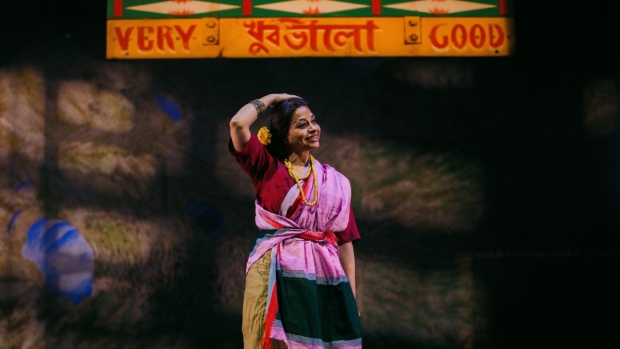”Chasing Hares” at the Young Vic – review

© Isha Shah
This impassioned new play from Sonali Bhattacharyya, which won Theatre Uncut’s Political Playwrighting Award, draws direct comparisons between the use of child labour in India and the current UK gig economy. It also paints a moving portrait of a father and daughter separated by a generation – and a continent – but united by their bravery to stand up to exploitation.
Prab (Irfan Shamji) tells stories to his baby daughter in Kolkata. Although he works in a textile factory, he dreams of writing, and his opportunity comes via a Jatra group – a folk theatre tradition that involves retelling stories from the Mahabharata. Prab suggests some fresh material, which is jumped on by jaded lead actress Chellam (Ayesha Dharker), while charismatic star Devesh (Scott Karim) agrees on condition he also helps out in his family’s Dickensian factory.
It’s an intriguing if slightly too convenient set-up that suffers from extended passages of exposition. Prab and his wife Kajol (Zainab Hasan) spend much of their time explaining the economic and political landscape to each other, while Devesh is a somewhat cartoonish villain, making Prab rewrite his story of a woman leading a peasants’ revolt to make him the hero, and using the swish apartment he has lent the young family to conduct his sordid affairs.
Milli Bhatia’s cogent production takes place on designer Moi Tran’s bare, revolving cubic stage, with scenes playing out in largely linear order (besides the framing scenes, in contemporary London). The stylistic flourish comes mainly in the form of video designer Akhila Krishnan’s shadowy projections, which surround the stage when Prab is telling his stories; it’s a nice touch that lends a welcome element of otherworldliness and magic. Shoes are used to represent the factory workers, a motif that emphasises both the product and the futility of their labours.
It all feels very serviceable if not spectacular, and the same goes for the cast. The stand-out is Dharker, whose acerbic Chellam (her lines are littered with f-bombs) exudes wit and razor-sharp intelligence. She more than anyone understands the dilemma facing Prab; namely that the ideology of his stories all too easily crumbles in the face of money and patriarchy. Meanwhile, Shamji captures the protagonist’s nobility – he’s a man hoping to heal the world with his pen, but is forced into more direct action.
Although her point is delivered via sledgehammer, Bhattacharyya makes a sobering and timely analogy between contemporary Britain and the exploitative labour found in places such as West Bengal – where her uncle worked in a rubber factory that introduced ‘zero hours’ contracts. As she says in a programme interview, the current level of inequality is “not just unfair, it’s also unsustainable”. The closing moments, featuring Prab’s grown-up daughter (Saroja-Lily Ratnavel), are an unapologetically direct call to arms, one that was greeted with audience cheers. Agitprop this may be, but it’s stirring stuff.










